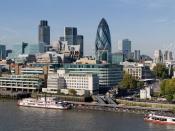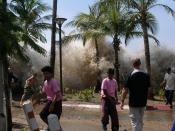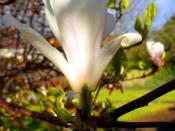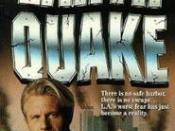The power of nature is one which cannot be described with a single blanket term. Jack London's experience with the fierce Los Angeles earthquake differs greatly from that of Roger Ascham's wintery horse ride account. Nature's gentle serenity, utter magnitude and astounding impact even after a brief visit, have intrigued man for centuries.
Jack London describes in depth the sheer power of the Los Angelesearthquake.
The author successfully uses imagery to portray the chaotic scene for the reader by saying for instance that, "The streets were humped into ridges and depressions and piled with debris of fallen walls. The steel rails were twisted into perpendicular and horizontal angles." The earthquake's awesome power is depicted even in the beginning of the document when London describes how the natural disaster ruined "thousands of dollars' worth of walls and chimneys." The force also exhibited enough magnitude to ignite many fires in the factories of the working-class ghetto according to London.
Strong imagery and an almost anguishing mood is also used to describe the infernos by describing how "Time and again successful stands were made by the firefighters, and every time the flames flanked around on either side, or came up from the rear, and turned to defeat the hard-won victory." You can almost sense the desperation from the men who risked their lives to extinguish all the flames the brief earthquake caused.
The power of the wind is one which Roger Ascham chooses to portray on a more serene level. He depicts an almost isolated setting in a rural location and his amazing experiences with the wind and snow. Due to his clear use of imagery one can almost see the dancing snow when he says, "so as the wind blew, it took the loose snow with it, and made it so slide upon the snow in the field." The use of the words "hard and crusted by reason of the frost over night" (line 11) is a good use of terms which help trigger sensory images. The wind's subtle fierceness can be seen in the fact that Ascham describes the wind as unable to be seen by man and yet goes on to later say that "Sometimes the wind would be not past two yards broad, and so it would carry the snow as far as he(I) could see." In Ascham's description of the snow, one almost senses a subtle form of alliteration in saying "Sometimes the snow would tumble softly; by and by it would fly wonderful fast." The two men's experiences with the forces of nature's impact differed greatly.
London uses repetition throughout his last paragraph by starting almost every sentence with "An enumeration..." to drive the point across of how the earthquake tore apart the lives' of the people who were forced to endure it. The author also describes earlier on how "The industrial section was(is) wiped out" thus causing the city to have to be for the most part rebuilt. After the disaster the city was nothing more than a meager skeleton of what it used to be. In addition, London describes with such vivid imagery how the skies remained dark and the sun red which was only a minor reprocution of the horrible occurrence.
The impact of wind on one's senses is less physically severe than that of an earthquake, but is more influential on a spiritual level. Ascham describes the wind by using a literary technique of comparison in that he "say two winds, by reason of snow, the one cross over the other, as it had been two high ways." In using such a comparison it helps to evoke images in the minds' of the readers. The author speaks of the wind with a sort of mystique and awe such as when he says "I should hear the wind blowin the air, when nothing was stirred at the ground." The presence of the wind appears to leave Roger with a greater sense of unity with nature than before he under went the experience.
In conclusion, the power and results of nature are unpredictable and each force possesses its own unique characteristics. Whether it be from London's detailed description of an earthquake's aftermath to Ascham's tale of the wind's intriguing movements, it can be said that nature's forces whether extreme or mild leave the viewer with a greater sense of understanding upon witnessing them.





